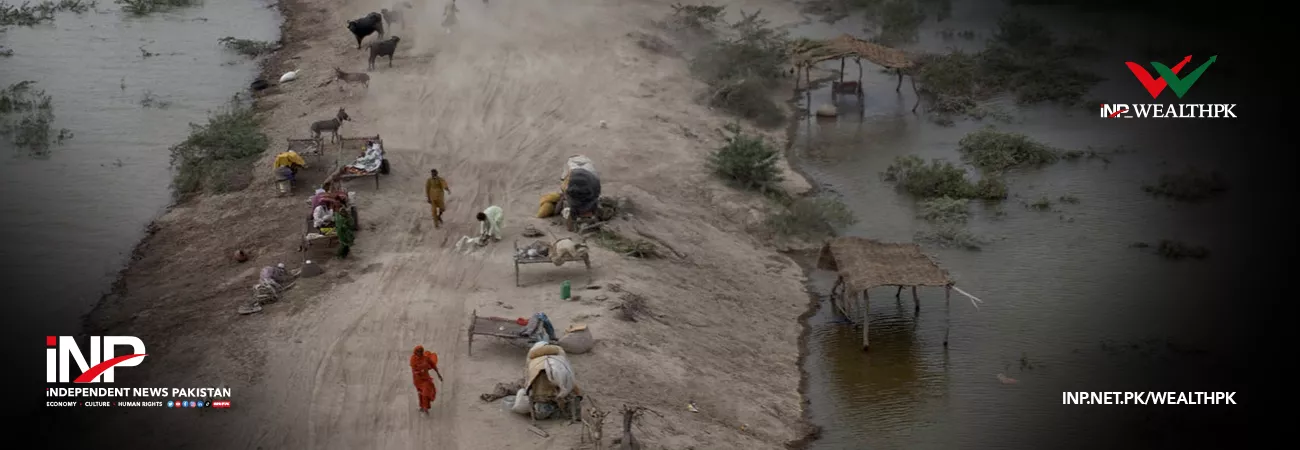INP-WealthPk
Faiza Tehseen
Encroachments along the Right and Left Bank Outfall Drains on the Indus River blocked the waterway, causing great losses to the agricultural land and livelihood sources of people during the summer floods.

Due to encroachments, water level increased from the usual 4,200 cusecs up to 12,000 cusecs, inundating large swathes of land. This was stated by Dr Muhammad Ismail Kumbhar, chairman of the education extension department of the Sindh Agriculture University, Tandojam. Talking to WealthPK, he said about 4,362,657 acres of agricultural land and crops worth Rs364 billion were ruined by floods in the province. He said that 23 districts across the province were declared calamity-hit, and Sindh province had different ecological zones.
He said climate conditions must be considered before planning any housing or commercial constructions. He said Bandhi, Mirpurkhas, Nawabshah, Badin and Sanghar were called the depression in Sindh. “In Badin, there are about 1,208 natural wetlands that must be rid of any encroachments. All other old/new waterways should also be cleared of encroachments to ensure proper water drainage.”
Muhammad Ismail said post-disaster management like proper dewatering was a must to minimise the health risks arising out of waterborne diseases. He said satellite images showed that 20% of the area in Dadu was still underwater. “The same situation is prevailing in other areas like Naushahro Feroz, Khairpur, Ghotki, Qambar Shahdadkot, Larkana, Jacobabad, Badin, Tando Muhammad Khan, Matiari, Mirpur Khas, Umerkot, Sanghar and Shaheed Benazirabad.”
Muhammad Ismail said damage caused to humans, livestock, vegetation, education, health, water, electricity and communication infrastructure was not properly carried out. He said the Sindh government needed to enforce a resilient climate change and land use policy with comprehensive short, mid, and long-term goals to be achieved. He said to mitigate the effects of climate-induced disasters, establishment of smart calamity resource centres was a must.
Talking to WealthPK, Saleh Mangrio, a social development expert from Hyderabad, said, “The majority of people in Sindh earn their livelihood through agriculture, but the devastating floods had destroyed their sources of income. Unfortunately, the disaster was not mainly caused by extreme water flow. It was rather caused due to encroachments and turning of waterways into trash depots. It is important to keep the waterways clear of any hurdle. That can be achieved by creating awareness among people.”
Nasir Ali Panhwar, an environmentalist, said the great socioeconomic loss in Pakistan, especially in Sindh province due to floods, was because of human error. “Blocking of natural and designed waterways caused the whole mess. Negligence of departments concerned to keep the water channels clear of any encroachments caused the widespread devastation.”
He also pointed out that disaster management committees were not functional in the province, and flash floods had damaged the right wing of the River Indus. “This time, the area around the river was not flooded, but encroachments, planning failure, and poorly designed drainage system of highways caused the catastrophe.”
Nasir Ali Panhwar pointed out that water drainage system was properly designed when railway lines were laid during the British era. “Now, our departments mostly deviate from the ecological/natural principles. And this mismanagement adds severity to every natural calamity.”
Credit : Independent News Pakistan-WealthPk













